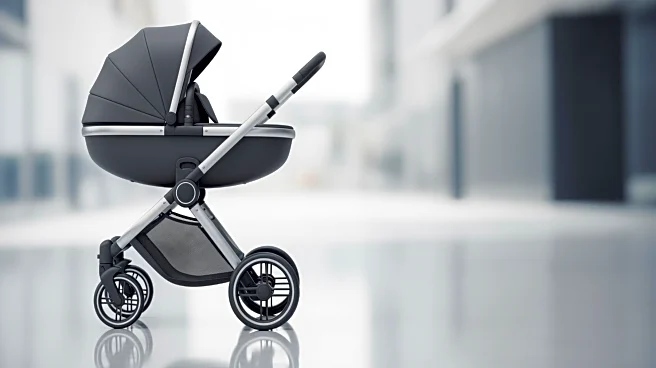What's Happening?
Mexican filmmaker Michelle Garza Cervera has reimagined the 1992 thriller 'The Hand That Rocks The Cradle' to reflect contemporary cultural dynamics. The film, originally directed by Curtis Hanson, now
features Mary Elizabeth Winstead as Caitlyn, an expectant mother who encounters Polly, played by Maika Monroe, at a tenants’ rights event. Polly later becomes the nanny for Caitlyn's family, which includes her husband Miguel and their children. Despite initial trust, Polly's actions soon deviate from Caitlyn's strict parenting guidelines, leading to tension and suspicion. The film delves into themes of trust, mental health, and the pressures of modern parenting, with Caitlyn's past experience of postpartum psychosis adding complexity to her character's journey.
Why It's Important?
This remake of 'The Hand That Rocks The Cradle' is significant as it addresses the evolving challenges of motherhood in today's society. By incorporating elements such as mental health awareness and the impact of societal pressures on parenting, the film resonates with contemporary audiences. It highlights the delicate balance parents must maintain between trust and vigilance, especially when external help is involved in child-rearing. The film also sheds light on the stigmatization of mental health issues, encouraging a broader conversation about postpartum conditions and their impact on family dynamics. This narrative could influence public discourse on parenting and mental health, potentially affecting societal attitudes and policies related to family support systems.
What's Next?
As the film gains attention, it may spark discussions among audiences and critics about the portrayal of mental health and parenting in media. The film's release could lead to increased interest in stories that explore similar themes, prompting filmmakers to address these issues more frequently. Additionally, the film might inspire further adaptations of classic thrillers to reflect modern societal issues, potentially influencing the direction of the thriller genre. Stakeholders in the film industry, including producers and directors, may take note of the film's reception and consider similar projects that resonate with contemporary audiences.
Beyond the Headlines
The film's exploration of mental health and motherhood could have deeper implications for cultural perceptions of parenting. By portraying a protagonist who struggles with postpartum psychosis, the film challenges stereotypes and encourages empathy and understanding. This could lead to a shift in how mental health issues are depicted in media, promoting more nuanced and realistic portrayals. Furthermore, the film's focus on the pressures of modern parenting may resonate with viewers, prompting discussions about the support systems available to parents and the societal expectations placed on them. These conversations could contribute to a broader cultural shift towards more supportive and inclusive attitudes towards parenting and mental health.









